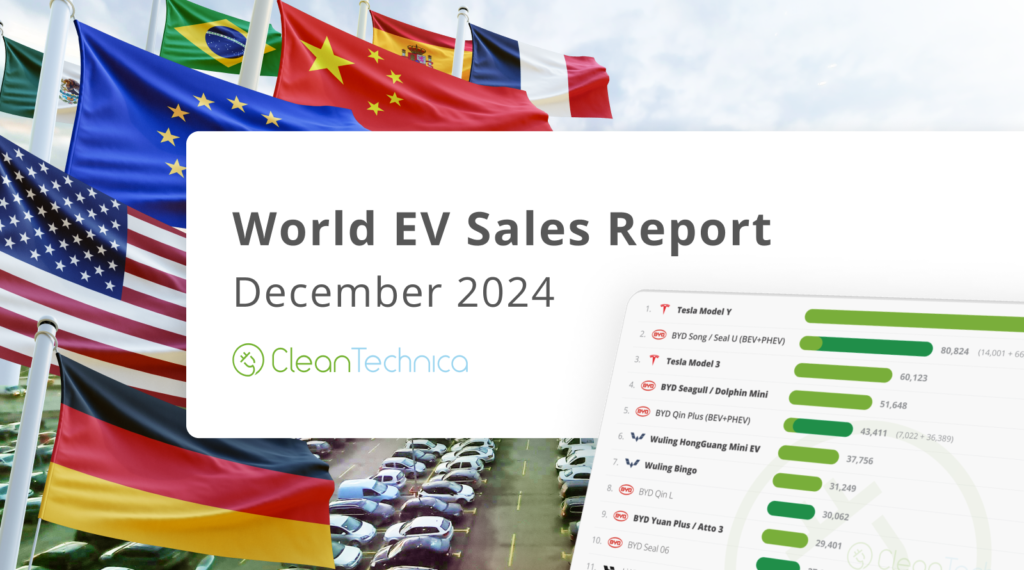
Sign up for daily news updates from CleanTechnica on email. Or follow us on Google News!
In the last stage of the 2024 race, BYD had another record month, this time with 483,000 registrations. That doubled Tesla’s result, which nevertheless wasn’t all that bad for the US brand — at 201,000 deliveries, it was its best result in 18 months.
Below the two galactics, Wuling was 3rd in the last month of the year, thanks to a record 88,435 registrations. Two models (the Mini EV and the Bingo) contributed decisively to this performance. #5 Li Auto also had a record month, delivering over 58,000 units, much thanks to the success of the L6 midsize SUV.
#6 BMW had a year-best month in December, thanks to the success of a number of its models — the iX1 (8,618 units), i4 (6,625), and X5 PHEV (5,304). Funny enough, BMW was the only legacy brand to post a result close to a record … in contrast to the Chinese makes, which had five record results in December.
As such, besides the aforementioned #3 Wuling and #5 Li Auto, #9 Leap Motor continued its never-ending success story, posting yet another record result in December, this time over 42,000 units.
At #11, Deepal, Changan’s premium brand, also posted a record result, 36,577 units, much thanks to the ramp-up of its new S05 compact crossover, which had close to 12,000 registrations in December.
But the current shooting star of the table is the #17 Xiaomi. Thanks to the raging success of its SU7 sedan, the make is already showing up on the radar of the brand ranking, despite offering just one model. With the brand set to sell over 300,000 units in 2025 (and maybe some 600,000 in 2026?), expect profitability to come fast to Xiaomi, probably already next year — which would be an amazing feat, going from zero to a profitable business in just two years!
Finally, Dongfeng this time showed up on the table at #20, with its best selling model being the cutesy Nammi 01, also known in Europe as the recently introduced Dongfeng Box.
Just off the table, but also with impressive results, we should highlight Ford, which delivered 22,859 units, its best result in two years. That allowed it to be the best selling US legacy brand. Much of this had to do with the continued success of the Mustang Mach-E (over 8,000 units) and F-150 Lightning (close to 6,000 units), but the European operations also helped, with the European Explorer EV landing some 3,100 deliveries.
In #23 we have another of Huawei’s startups, Luxeed. With a record 20,300 sales, it is already starting to show on the map.
Comparing 2024 with the 2023 ranking, the top two positions remained the same, but BYD increased its distance from Tesla — from 1 million units in 2023 to over two million units in 2024. Basically, BYD’s leadership will be untouchable in the next couple of years.
Still, don’t expect it to grow in 2025 as fast as before. BYD’s room for growth in its domestic market is small, now that it is already the best selling brand. This means the demand ceiling should be close in China. On the other hand, BYD is betting heavily on overseas markets, with factories going online in places like Brazil and Thailand. Sales abroad are the intended path for growth. There is a chance this could work, but it is far from a sure thing. The rate of BYD’s expansion overseas will be one of the most important stories of 2025.
On to Tesla. With its market share slowly eroding (17% in 2019, 16% in 2020, 14% in 2021, 13% in 2022 and 2023, 10% now), one wonders where its share will end in 2025. The US automaker will need to diversify its lineup if it ever wants to have a shot at recovering lost ground. Expect the rumored cheaper, compact vehicles said to land in 2025 to offer the volume and diversity needed to return to a growth path.
Elsewhere, the biggest changes in the ranking come from Geely, which jumped from 10th to 4th; AITO, which came out of nowhere and jumped in 9th position; and Leap Motor, which shot up from 20th in 2023 to the 12th in 2024.
Looking at bright spots in the legacy makes, while Volvo’s rise to #11 from #12 in 2023 is hardly surprising, given the success of the EX30 and XC60 PHEV, Kia’s rise up one spot to #13 in 2024 is rather surprising, especially considering that the Niro to EV3 succession plan is taking longer than expected.
But the real surprise on the legacy side is … Toyota. Yep, despite all the bad press, the Japanese make had a positive year when it comes to EVs, growing its sales by 69% YoY and jumping five positions on the way, from 19th to 14th. It gained market share as well, going from 1.1% in 2023 to its current 1.5% (nothing amazing, but it’s growth).
Reasons for this success? It can’t be attributed to just one model, but rather a combination of growing sales of its top selling models. Each of the six models sold over 10,000 units in 2024 (RAV4 PHEV, C-HR PHEV, Crown Crossover PHEV, Prius PHEV, bZ3, and bZ4X).
There were also two legacy brands that left the top 20, Jeep and Ford, meaning that the legacy contingent was reduced from 10 to 8, and Chinese makes are now the majority (11) of the table.
Chip in a few dollars a month to help support independent cleantech coverage that helps to accelerate the cleantech revolution!
Have a tip for CleanTechnica? Want to advertise? Want to suggest a guest for our CleanTech Talk podcast? Contact us here.
Sign up for our daily newsletter for 15 new cleantech stories a day. Or sign up for our weekly one if daily is too frequent.
CleanTechnica uses affiliate links. See our policy here.
CleanTechnica’s Comment Policy





